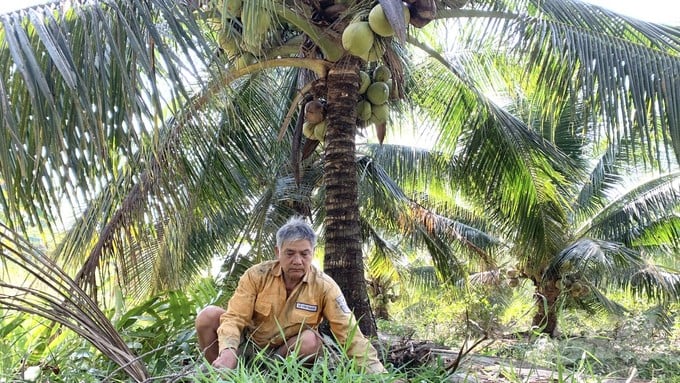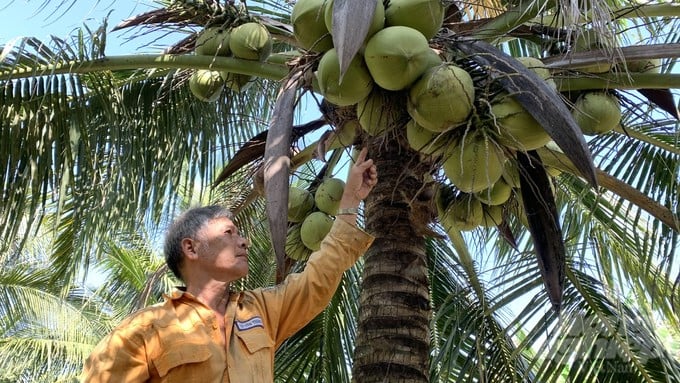May 18, 2025 | 20:17 GMT +7
May 18, 2025 | 20:17 GMT +7
Hotline: 0913.378.918
May 18, 2025 | 20:17 GMT +7
Hotline: 0913.378.918

Farmers absolutely do not use herbicides in coconut farming. Photo: Ho Thao.
Recently, the Plant Protection Department (PPD) announced important information: the Chinese side will organize an inspection of coconut growing areas and fresh coconut packing facilities in Vietnam to consider allowing the official-quota export of this commodity to the Chinese market. The inspection’s objective is not only to assess technical aspects but also to determine the pest risk to fresh coconuts, creating a premise for the signing of the protocol between the two countries.
It is expected that this inspection will take place in August 2023, combining online inspection and field inspection. During the inspection, the General Administration of Customs of China (GACC) will focus on the control and prevention of pests on coconuts and the coconut harvesting, transportation, and packaging processes for export.
In order to ensure the best preparation for this important inspection, PPD has asked localities to send technical staff to participate in supporting the online inspection. At the same time, complete documents and technical records related to pest management and prevention.
In Tra Vinh province, coconut trees have developed significantly, covering an area of about 26,000 ha. Especially among these, more than 5,000 ha have been cultivated according to the method of organic coconut farming. Along with focusing on developing high-quality coconut production, Tra Vinh has the second largest coconut-growing area in the Mekong Delta, just behind Ben Tre.
Currently, coconut farmers in Tra Vinh have applied many new technical processes to production in order to improve yield, quality, and value for coconut trees in a sustainable way. This is also a favorable platform to meet the requirements of growing areas to export fresh coconuts, including to the Chinese market.
Mr. Phan Duc Tai, Director of Thanh Tri Coconut Farming Cooperative in Huyen Hoi commune, Cang Long district (Tra Vinh), said that in recent years, the cooperative has disseminated the advanced and scientific technical processes of coconut farming to the farmers under the guidance of Tra Vinh’s agriculture sector.
On an area of 112 ha, with the participation of 246 farmer households, the cooperative has succeeded in building an efficient production model, focusing on two popular types of coconut, namely green Siamese coconut and red coconut, with an output of about 6,000 tons of coconuts/year.
With support from the Tra Vinh Department of Agriculture and Rural Development, the cooperative's production process is strictly implemented. A distance of 6m between coconut trees and 8m between tree banks has been maintained to ensure optimal conditions for crops. Digging holes and using organic fertilizers from cow and chicken manure combined with composting with Trichoderma fungus are applied by the cooperative. Chemical fertilizers are used in the stage of young trees, but after a year, the cooperative will switch to using organic fertilizers.

Tra Vinh farmers are facing the opportunity to increase the value of coconuts when they are officially-quota exported to the Chinese market. Photo: Ho Thao.
To control pests, Mr. Tai and the members of the cooperative regularly clean the garden and catch beetles. When there are signs of pests, farmers in the cooperative seek support from the District Plant Protection Station. Along with that, farmers also implement weed management by lawnmowers and absolutely do not use herbicides in coconut gardens. The information about the production log is carefully recorded. When harvesting, farmers maintain a record of the quantity to synthesize information for the Commune People’s Committee.
Compliance with strict, scientific, and safe coconut production processes will not only create favorable conditions to meet the requirements for export but also help improve the quality and value of coconut products.
Currently, Tra Vinh province is also preparing well for the requirements of growing areas and packing facilities to meet the technical requirements of the Chinese side when implementing local inspection.
Mr. Le Van Dong, Deputy Director of the Tra Vinh Department of Agriculture and Rural Development, emphasized that the export of fresh coconuts is a great opportunity for the province's coconuts, bringing better income to farmers and making an important contribution to promoting the province’s economic development.
Currently, Tra Vinh province has six coconut packing facilities for export. The province's coconut-growing area is also continuously increasing. According to the plan, by 2030, the coconut area of Tra Vinh is expected to grow by 800 ha. The work of granting coconut-growing area codes for export has also been deployed and effectively managed by the province.
Translated by Huyen Vu Thu

(VAN) In the face of counterfeit and imitation products, Khanh Hoa Salanganes Nest Company hopes for the prompt completion of the legal framework, strict enforcement against violations, and protection of the bird’s nest brand.

(VAN) Japan's efforts to lower the price of rice through the release of its stockpile may finally be making some progress, albeit at a snail's pace.

(VAN) U.S. tariffs are not only a 'shock', but also an opportunity for Vietnamese businesses to renew their mindset toward comprehensive development.

(VAN) As Bac Giang lychee enters the harvest season, Minister Do Duc Duy expects that the fruit will contribute greatly to agricultural exports due to standardized production and deep processing.

(VAN) Consumers have shown a preference for free-range eggs, but those farming systems are more vulnerable to biosecurity risks like bird flu.
/2025/05/09/5701-1-184335_301.jpg)
(VAN) Vietnam’s eel exports nearly doubled thanks to a mud-free farming model, opening up new prospects while still facing numerous barriers related to international standards.

(VAN) Minister Do Duc Duy warned that if production is not professionalized and supply chains are not transparent, the U.S. market could become a growth bottleneck.